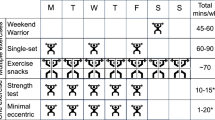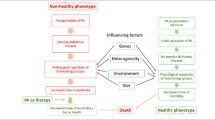Abstract
Purpose of Review
The purpose of this paper is to review the epidemiology of obesity and the most recent literature on popular fad diets and exercise regimens that are used for weight loss. The weight loss plans that will be discussed in this article include juicing or detoxification diets, intermittent fasting, the paleo diet, and high intensity training.
Recent Findings
Despite the growing popularity of fad diets and exercise plans for weight loss, there are limited studies that actually suggest these particular regimens are beneficial and lead to long-term weight loss. Juicing or detoxification diets tend to work because they lead to extremely low caloric intake for short periods of time, however tend to lead to weight gain once a normal diet is resumed. Both intermittent fasting and the paleo diet lead to weight loss because of overall decreased caloric intake as well. Lastly, studies on short bursts of high intensity training have shown remarkable weight loss and improvements in cardiovascular health.
Summary
Review of the literature does suggest that some fad diets and exercise plans do lead to weight loss; however, the studies are quite limited and are all based on the concept of caloric restriction.
Similar content being viewed by others
References
Papers of particular interest, published recently, have been highlighted as: • Of importance •• Of major importance
• Ward ZJ, Long MW, Resch SC, Gortmaker SL, Cradock AL, Giles C, et al. Redrawing the US obesity landscape: bias-corrected estimates of state-specific adult obesity prevalence. PLoS ONE. 2016;11(3):e0150735. https://doi.org/10.1371/journal.pone.0150735. Addresses the discrepancy of data when using self-reporting surveys. This shows how the CDC probably has underestimated obesity prevalence in the USA.
Finkelstein EA, Trogdon JG, Cohen JW, Dietz W. Annual medical spending attributable to obesity: payer-and service-specific estimates. Health Aff. 2009;28(no5):w822–31. https://doi.org/10.1377/hlthaff.28.5.w822. originally published online July 27, 2009
Wabitsch M, Moss A, Kromeyer-Hauschild K. Unexpected plateauing of childhood obesity rates in developed countries. BMC Med. 2014;12:17. https://doi.org/10.1186/1741-7015-12-17.
Klein A, Kiat H. Detox diets for toxin elimination and weight management: a critical review of the evidence. J Hum Nutr Diet 2014. https://doi.or/10.1111/jhn.12286.
Mazurak N, et al. Effects of a 48-h fast on heart rate variability and cortisol levels in healthy female subjects. Eur J Clin Nutr. 2013;67:401–6. https://doi.org/10.1038/ejcn.2013.32.
Tomiyama AJ, Mann T, Vinas D, Hunger JM, DeJager J, Taylor SE. Low calorie dieting increases cortisol. Psychosom Med. 2010;72(4):357–64. https://doi.org/10.1097/PSY.0b013e3181d9523c.
Getting JE, et al. Oxalate nephropathy due to juicing: case report and review. Am J Med. 2013;126:768–72.
Worcester EM, Nakagawa Y, Bushinsky DA, Coe FL. Evidence that serum calcium oxalate supersaturation is a consequence of oxalate retention in patients with chronic renal failure. J Clin Invest. 1986;77(6):1888–96.
Mattson MP, et al. Impact of intermittent fasting on health and disease processes. Ageing Res Rev. 2016; https://doi.org/10.1016/i.arr.2016.10.005.
Johnson JB. Alternate day calorie restriction improves clinical findings and reduces markers of oxidative stress and inflammation in overweight adults with moderate asthma. Free Radic Biol Med. 2007;42:665–74.
Wan R. Cardioprotective effect of intermittent fasting is associated with an elevation of adiponectin levels in rats. J Nutr Biochem. 2010;21:413–7.
Fond G. Fasting in mood disorders: neurobiology and effectiveness. A review of the literature. Psychiatry Res. 2013;209:253–8.
Harvie M, Wright C, Pegington M, McMullan D, Mitchell E, Martin B, et al. The effect of intermittent energy and carbohydrate restriction v. daily energy restriction on weight loss and metabolic disease risk markers in overweight women. Br J Nutr. 2013;110(8):1534–47. https://doi.org/10.1017/S0007114513000792.
Goodrick CL, et al. Effects of intermittent feeding upon growth and life span in rats. Gerontology. 1982;28(4):233–41.
•• Pitt C. Cutting through the Paleo hype: the evidence for the Palaeolithic diet. AFP. 2016;45(1–2):35–38. Summarizes nine recent articles on the Palaeolithic diet describing different measured outcomes with most including weight loss in their outcomes.
Mellberg C, Sandberg S, Ryberg M, et al. Long-term effects of a Palaeolithic-type diet in obese postmenopausal women: a two-year randomized trial. Eur J Clin Nutr. 2014;68(3):350–7. https://doi.org/10.1038/ejcn.2013.290.
Genoni A, Lo J, Lyons-Wall P, Devine A. Compliance, palatability and feasibility of PALEOLITHIC and Australian guide to healthy eating diets in healthy women: a 4-week dietary intervention. Nutrients. 2016;8(8):E481. https://doi.org/10.3390/nu8080481.
Hazell T, et al. Running sprint interval training induces fat loss in women. Appl. Physiol Nutr. 2014;39:1–7.
Fisher, G. et al. High intensity interval vs moderate intensity training for improving cardiometabolic health in overweight or obese males: a randomized controlled trial. PLOS ONE (2015) DOI: https://doi.org/10.1371/journal.pone.0138853.
Bagley L, Slevin M, Bradburn S, et al. Sex differences in the effects of 12 weeks sprint interval training on body fat mass and the rates of fatty acid oxidation and VO2max during exercise. BMJ Open Sport Exerc Med. 2016;2:e000056. https://doi.org/10.1136/bmjsem-2015-000056.
Author information
Authors and Affiliations
Corresponding author
Ethics declarations
Conflict of Interest
The authors declare that they have no conflict of interest.
Human and Animal Rights and Informed Consent
This article does not contain any studies with human or animal subjects performed by any of the authors.
Additional information
This article is part of the Topical Collection on Nutrition and Obesity
Rights and permissions
About this article
Cite this article
Obert, J., Pearlman, M., Obert, L. et al. Popular Weight Loss Strategies: a Review of Four Weight Loss Techniques. Curr Gastroenterol Rep 19, 61 (2017). https://doi.org/10.1007/s11894-017-0603-8
Published:
DOI: https://doi.org/10.1007/s11894-017-0603-8




